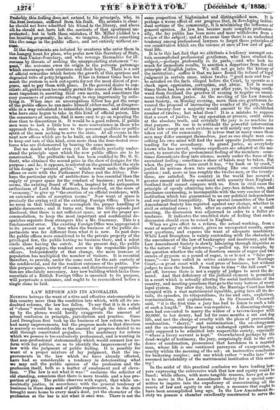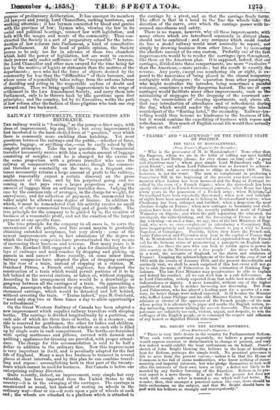LAW REFORM AND ITS ANOMALIES.
NOTHING betrays the want of altive and effective statesmanship in this country more than the condition into which, with all its un- doubted reforms, the law has fallen. To say that it is in a state of "chaos" would be an exaggeration, though the idea called up by the phrase would hardly exaggerate the amount of actual confusion in principle, jurisdiction and practice. Since Lord Brougham first took up the business of law reform we have had many improvements, but the progress made in that direction is scarcely considerable as the amount of progress denied to us stall through constituted prejudice. The machinery for reform which we possess is too exclusively professional, and is wanting in that non-professional statesmanship which would connect law re- form with lay polities, so as to identify the improvement of the law with the judgment of public feeling. It is possibly for want of a proper mixture of lay judgment, that the im- provements in the law which we have already effected, have had so considerable a tendency in deteriorating what we may call the public opinion of the profession and the profession itself, both as a matter of emolument and of eleva- tion. "The law is not what it was !" exclaims the solicitor of old standing, conscious that there is more trouble and a less pro- portion of pay. The public observes with regret, that while un- doubtedly justice, in accordance with the general tendency of business in these days and of public requirement, is in the main brought more home to every man's door, yet the character of the profession at the bar is not what it once was. There is not the tic-alliftoe..
It is this last fact that we attribute a tendency amongst cer- tain accomplished professional geatlemen, who have studied the suldect,---perhaps profoundly in its parts,—and who look too much for immediate results, to sanction a departure from the old principle of English juries. We will not go into the history of the.institution ; suffice it that we. have Pipad the refusal and usaaloftrluegae judgment in certaip. cases, unless twelvei.".good m
be,satisfied. on thotifacts alleged before thOourt, to operate as a check apon, oppreasion, corruptlen, and,,,fdause. Yet in recent tizisca there luis been an attempt, ygg,Anq year, to .bring south- ward, from Scotland the practice or ceasmg to require an unani- mous ,verdict from juries. At the meeting of the law Amend- ment Society, .ori Monday evening more than one gentleman fa- voured the proposal of increasing evening,, number of the jury, so that out of twenty-four a majority would amount to the established number of twelve; , hut what then? It is a mis,take,to suppose that a court Of jUstice, by any operation or process, could arrive at the absolute truth, and cer ■Vinly the jury is no machine for that purpose. Its use is to withhold the ,powerful intervention of the law except on such evidence as will satisfy any twelve men taken out of the Community. It is true that in Many cases those men may differ amongst themselves, just as one single man con- sulting his own mind will find the most opposite judgments con- tending for the , ascendancy. In grand -juries, as -everybody knows who has served, various expedients are adopted at the mo- ment, to ascertain the predominant feeling of the members : some- times dissentients drop into silence, merely under the force of the ascendant feeling ; sometimes 'a show of hands may be taken. But when the jury comes into court it has, "by hook or by crook," jostled its notions down into something like one eonsolidated opinion ; and, more or less roughly the twelve men, or the twenty- three, are satisfied. No country in the world has secured a greater amount of liberty combined with security than England; Scotland itself cannot compare with us. Even in civil cases the principle of openly admitting into the jury-box debate, vote, and perchance canvassing, is incompatible with the very essence of that institution which has guaranteed to us our political independence and our political tranquillity. The special committee of the Law Amendment Society has reported against any change, whether in civil or criminal cases ; but, after an earnest debate at a small meeting, the discussion was adjourned in order to a fuller at- tendance. It indicates the unsettled state of feeling that such a discussion should even be raised in England. When we give effect to a reform, the actual working, from a want of mastery at the outset, gives us unexpected results, opens new questions, and exposes the want of adequate machinery. While Lord Brougham is vainly contending with the obstacles to the amendment of the law of bankruptcy and insolvency, and the Law Amendment Society is slowly labouring through inquiries as to the nature of "false pretences —pulled up, for example, by the question whether the sale of fourteen ounces of sugar and two ounces of gypsum as a pound of sugar, is or is not a "false pre- tence,"—we have called in active existence the new Marriage Court,—a great court with a vast press of business, but without judges to man the bench. From time to time "the full court" is put off, because there is not a supply of judges to meet the de- mand. And that deficiency of the judicial element is permitted in a court which is actually altering the social institutions of the country, and mooting questions that go to the very bottom of every legal system. Day after day, lately, the Marriage Court has been occupied with a vast matrimonial squabble, going into all its de- tails, its episodes, its vituperations, its ins and outs, expletives, reeriminations, and explanations. As Sir Cresswell Cresswell said, "it is the first time a jury has had to listen to such a tale at such a length." The case was repulsive. A dissenting clergy- man had consented to marry the widow of a tavern-keeper with 50,0001. to her dowry, had led for some months a cat and dog life, and met the charge of cruelty with the pleas of provocation, condonation, "sherry," and recrimination ; the ex-clergyman and the ex-tavern-keeper having exchanged epithets not gene- rally supposed to be admitted into respectable society, especially "where a livery servant is kept." Overwhelmed perhaps by the dead-weight of testimony, the jury, surprisingly dull to the evi- dence of condonation, pronounces that harshness in a married man, whose life is one continued paroxysm of exasperation, is cruelty within the meaning of the act ; an instructive conclusion for bickering couples ; and one which rather "walks into" the assumed inviolability of the matrimonial institution of this cowl-
In the midst of this practical confusion we have leading law- yers expressing the subversive wish that law and equity could be fused; while others, with more tangible reasons, have got so far as to move in the Law Amendment Society for a special com- mittee to inquire into the expediency of concentrating all the courts of law and equity in one place, a measure that ought to have been accomplished long ago. In the Law Amendment So- ciety we possess a chamber excellently constructed to serve the
same prnpertion of highminded an4stinguis1ffnn. It is perhaps avipree effect of our progress, bat, in developing indivi- dual sections of the community, it ia'sninimizing the influence of generalnpiniou. As law has become more complete profession- ally, the public has been more and more withdrawn from a reviewaifthe subjeet;,; and at the same time there is an undoubted tendeney„araong professional lawyers to forget those principles of our constitution which are the essence at once of law and of poli- of preliminary deliberation. It has amongst its members ea Wvyers and young., Lord Chancellors, sueking barristers, and working attornies ; it has laymen connected by blood and genius with the province of law ; laymen who, viewing the law in its social and political bearings, connect law with legislation, and both with the usages and wants of the community. 'Thus con- structed the Society is a sort of preparatory school for the intro- ductiOn of :law retorms into Parliament, a kind. of consultative prse-Parhanient. At the head Of public opinion the Society' proves to be only too far in advance of those opinion, chambers which, hold the power of legislation, hitt are wont to exercise their powers only under aniferance of the " responsible " lawyers, the /-,ertl Chancellor and other men swayed for the time being far leis by the motives of legists or statesmen than the motives of the departments ; men who feel the force of objects desired by the community far less than the "difficulties" of their bureaux, and whose sense of reponsibility takes refuge from the arduous labour of deciding and acting in the respectable asylum of doubt and abnegation, Thus we bring specific improvements to' the verge of settlement in the Law Amendment Society, and carry them mite Parliament, only to be thrown back by idle questions upon first" principles; and the country, led by its Executive, walks the path of law reform after the fashion of those pilgrims who took one step forward and two backward.



































 Previous page
Previous page